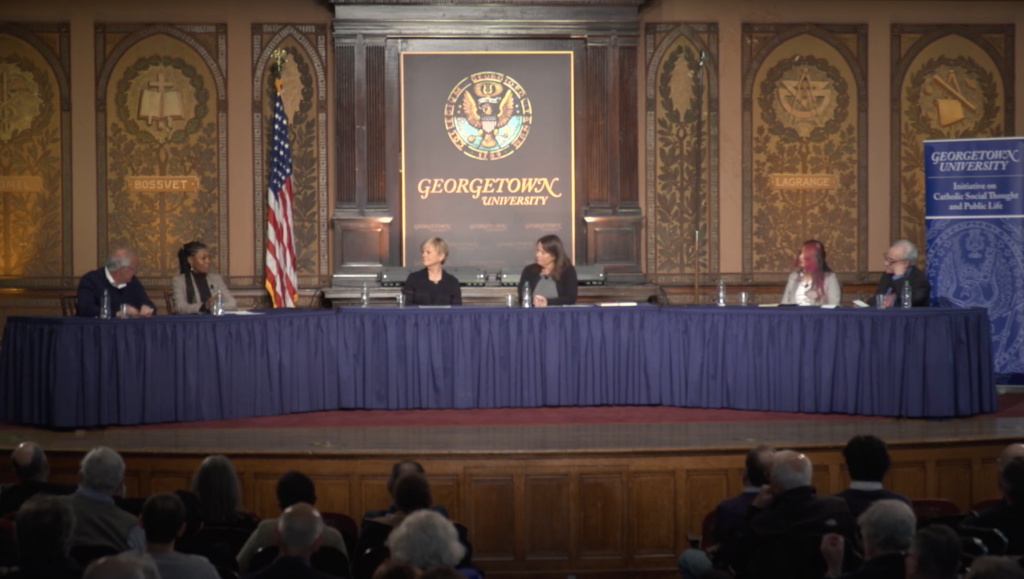The COVID-19 pandemic has permanently impacted mental health and welfare policies, panelists said at a March 28 event.
The event, titled “So What Did I Miss? A Look Back, A Look Around, A Look Ahead After Two Years of COVID,” featured four journalists and Mirka Sosa (COL ’23), recipient of the Campus Compact Newman Civic Fellow for her work with immigrants and the Latino community, in a discussion about the lasting effects of the pandemic. The Initiative on Catholic Social Thought and Public Life hosted the event, and Kim Daniels, co-director of the Initiative, moderated the discussion.
The COVID-19 pandemic exacerbated socioeconomic inequalities, especially when it comes to education, according to Sosa, who is involved in the D.C. Schools Project, a program that provides English literacy tutoring to students from immigrant backgrounds.
“I shared the same internet source with my two sisters and there was a lot of background noise in our homes and the connection wasn’t stable,” Sosa said. “A lot of my tutees experienced this too and fell behind in terms of curriculum, and there were a lot of disparities in terms of who can have access to a good education.”
According to the World Economic Forum, the pandemic forced an estimated 1.2 billion students around the world out of the classroom, and over 55 million K-12 students in the United States were impacted by pandemic closures in 2020.
In addition to exposing inequities in access to education, the pandemic also exacerbated stress levels and worsened a nationwide mental health crisis, according to David Brooks, a columnist for the New York Times.
“The most important thing that has been accelerated by COVID has been the social, emotional and psychological crisis in this country,” Brooks said. “There has been a 33% rise in suicide; 40 to 50% rise in depression rates; 45% of college students say they have endured periods of stress so high that they could not function; 54% of Americans say nobody knows them well; and the number of people with no close friends has quadrupled. This is a period of social pain that has been building for the last 20 years and COVID sent it into overdrive.”

During the pandemic, about 30% of U.S. adults reported symptoms of anxiety or depression, according to a December 2021 report by the Kaiser Family Foundation, a nonprofit organization devoted to national healthcare policy and journalism.
While employment and output levels stagnated over the pandemic, welfare policies positively impacted the economy, according to E.J. Dionne, columnist at the Washington Post and professor at the McCourt School of Public Policy.
“Poverty actually fell during the pandemic because the government actually acted and did all sorts of things to keep the economy from collapsing, like implementing the child tax credit,” Dionne said. “We are however backing up from that and not learning from those lessons to apply during the good times. There is this discontent, disorder and unhappiness. But I have seen in my students and in alot of young people, a sense of determination about making the country more democratic and just.”
Congress has approved about $4.5 trillion in total pandemic related federal aid spending, including $900 billion in COVID-19 aid signed into law by the Trump Administration and the Biden Administration’s American Rescue Plan. This includes spending on education, healthcare and social welfare, as well as programs such as the Paycheck Protection Program loans, which help businesses maintain their workers’ employment status.
Coming out of the pandemic, individuals must adjust to new social norms while demanding legislative change, according to Brooks.
“When we go back to looking at what normal looks like we have to ask: What is freedom? What is good? How do we make people care for each other?” Brooks said. “I think that although there might be a dawning realization that the autonomy and loneliness that has come from the pandemic can be harmful in the long run, we are now at a tipping point and need to figure out what the new normal will be.”




















